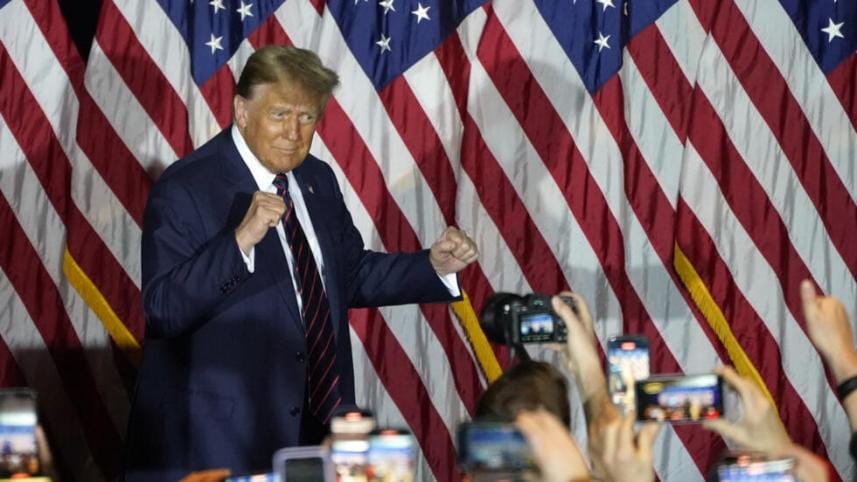Trump’s impunity and the Republican Party meltdown

Former President Donald Trump, it would seem, has more lives than the proverbial cat, politically speaking. Consider the recent verdict where he was ordered to pay $83 million for defaming columnist E. Jean Carroll. In a more salubrious era, such public disgrace would swiftly end a political career in the US. In today's more brazen, debased age, it is fuel for partisan grandstanding that continues to power Trump's improbable yet seemingly inevitable march to the Republican nomination for US presidential elections this year.
Trump, being Trump, completely dismissed the verdict of a jury as a partisan witch-hunt. How exactly a jury can be partisan defies logic, but no matter. Trump supporters are only too happy to agree, and today they have such a chokehold over the Republican Party that there's hardly been a murmur of protest from party honchos. The reaction of former South Carolina Gov. Nikki Haley is a good example. Haley, the last person left standing in the Republican Party primary to stop Trump's triumphant march to the party ticket, did criticise Trump, but it was a notably feeble, mealy-mouthed effort.
To get a sense of just how drastically the political climate has changed, it helps to take a cursory look at US presidential history. Beginning with Richard Nixon's Watergate (Nixon's henchmen illegally broke into Democratic headquarters), Jimmy Carter's Billygate (his brother Billy got a payment from Libya), Ronald Reagan's Iran-Contra (White House operatives sold arms to Iran to fund rebels in Nicaragua) to Bill Clinton's Lewinsky (Clinton's liaison with intern Monica Lewinsky which led to his impeachment)—US presidential history has a rich treasury of scandals.
This is where we are today: Trump faces 91 felony counts, and is charged with an array of crimes, from trying to subvert democracy, risking national security secrets to falsifying business records in connection with a hush money payment to a porn actress. Despite all of that, he appears to be a shoo-in for the Republican nomination and also appears likely to give US President Joe Biden a run for his money in the November elections.
The Watergate scandal forced Nixon to resign in disgrace. On Aug. 7, 1974, three top Republican leaders paid Nixon a visit. Senators Barry Goldwater, Hugh Scott and John Rhodes had a blunt message for the Republican president. Two days prior to that, the White House had taped conversations that proved, beyond a doubt, that Nixon had lied about having nothing to do with a cover-up of the Watergate break-in. The Republican leaders told Nixon that there just weren't enough Republican votes in Congress to prevent impeachment. Nixon resigned the next day in disgrace.
One must not give more credit than due to Nixon's resignation. Fierce partisanship was alive and well in those days as well. Republicans in Congress fought tooth and nail to protect Nixon. It was only after the White House tapes surfaced, that made Republicans relent. It is a sorry commentary on contemporary US politics that this kind of principled political stand is unthinkable in today's Republican Party. However, it didn't happen in a day. In fact, one got a disquieting inkling of how corrosive Trump's influence was on the party all the way back in 2016 when he began his campaign. When it emerged that Trump had made an egregiously lewd remark about how famous men could get their way with women, most Republican leaders and many pundits pronounced that his campaign was finished. However, something extraordinary happened. There was hardly a dent in Trump's core support, and Republican leaders were forced to eat their words. Trump, it turned out, defied all rules of political decorum.
Trump became the first presidential candidate in US history to refuse to concede an electoral loss, and he continues to deny that he lost. His provocation led to a mob attack on the US Capitol, the sanctum sanctorium of US democracy.
This is where we are today: Trump faces 91 felony counts, and is charged with an array of crimes, from trying to subvert democracy, risking national security secrets to falsifying business records in connection with a hush money payment to a porn actress. Despite all of that, he appears to be a shoo-in for the Republican nomination and also appears likely to give US President Joe Biden a run for his money in the November elections.
How did this come to pass? I am the first person to put a lot of blame on Trump's unscrupulous polarising politics—but I also think Trump is a distraction. He is more a symptom rather than the cause of the current political crisis in the US. The actual cause is a meltdown of the Republican Party. Trump is just a canny beneficiary.
As an acutely shrewd political observer, Trump has exploited political nihilism within the party that has been pickled in the right-wing media entertainment complex like Fox, Newsmax and Infowars. Consequently, you have a substantial political constituency in the party that is stewing in a witches' brew of conspiracy theories, xenophobia, anti-intellectualism and White victimhood. What's more, they live in an information bubble, uninterested in policy debates, and beyond the reach of reason and mainstream media. It's politics driven by hatred of who you are against rather than who you support or policy goals you want to attain. Note how Republicans, who are in control of the US House of Congress, are failing to legislate. Marshalling these people is harder than herding cats.
The story of Trump is the story of a canny politician who has a keen sense of his constituency and who has succeeded in building it into a cult-like following. It may or may not be an overwhelming majority even within the party, but given his constituency's vindictive animus, any Republican knows that you cross him at your peril. Mark Sanford, a South Carolina Congressman, learned this the hard way, when his criticism of Trump resulted in fighting a losing battle in a primary, unheard of for an incumbent Congressman.
Sadly, for the Republican Party, what has happened is the opposite of what should have happened. Instead of electoral politics and veteran, sensible Republican politicians tempering Trump's autocratic, extremist tendencies, large swaths of the Republican Party—whether out of conviction, fear or opportunism—have morphed into a caricature of Make America Great Again—Trump's moniker for his constituency.
Take Elise Stefanik, who used to be a moderate, Harvard-educated Republican Congresswoman from upstate New York. She has transmogrified into a shrill Trump supporter raging against "elite universities." Today she considers herself "ultra-MAGA and proud of it," and unabashedly denies the validity of the 2020 presidential election results.
This does not bode well at all for US politics. The US is essentially a duopoly, with the Democratic Party and Republican Party running the nation. Unless there is give-and-take and a readiness to thrash out policy differences into workable compromises, governance will continue to be a challenge. For the Republican Party—apparently determined to go off the deep end—this challenge is likely to be increasingly difficult in the near future.
Ashfaque Swapan is a writer and editor based in Atlanta, US.
Views expressed in this article are the author's own.
We welcome your contributions and analysis of global events. To submit articles to our weekly page, Geopolitical Insights, please send an email to ramisa@thedailystar.net
Follow The Daily Star Opinion on Facebook for the latest opinions, commentaries and analyses by experts and professionals. To contribute your article or letter to The Daily Star Opinion, see our guidelines for submission.




 For all latest news, follow The Daily Star's Google News channel.
For all latest news, follow The Daily Star's Google News channel. 

Comments